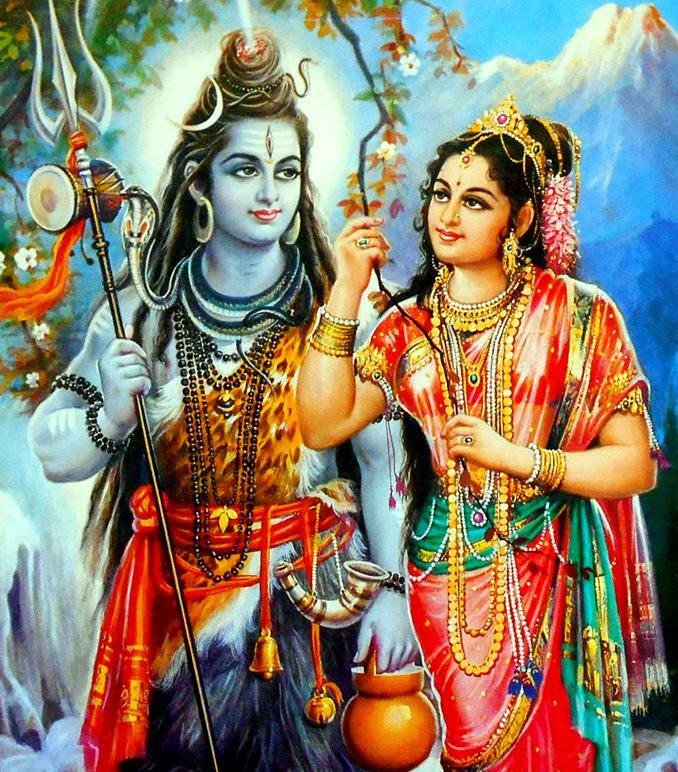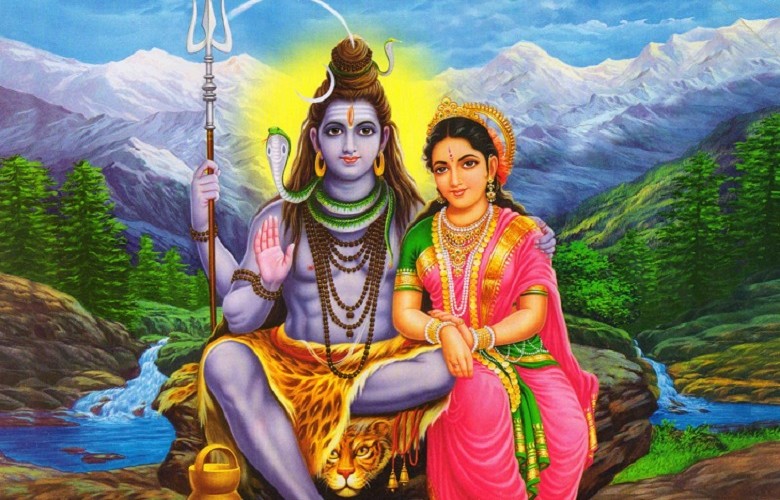No products in the cart.
Maha Shivratri is an auspicious and great festival of convergence of Shiva and Shakti. Masik Shivratri which is celebrated every month on the Chaturdashi Tithi of Krishna Paksha, is known as Maha Shivaratri (which is observed once a year) in the month of Magha, according to Amavasyant School. Again, according to Purnimant School Masik Shivaratri in the month of Phalguna is known as Maha Shivaratri. In both schools it is naming convention of lunar month which differs. However, both Purnimant and Amavasyant Schools, celebrate all Shivaratris including Maha Shivaratri on same day.
The day of Maha Shivratri is dedicated exclusively to the worship Lord Shiva and is observed with great great devotion to appease the Supreme One.
Maha Shivratri Story
There are many mythological legends associated with this day.
- According to a popular legend, when a hunter could not find anything to kill for food in a forest, he waited on the branch of a Woodapple tree. In order to attract a deer, he started throwing the leaves of the tree on the ground, unaware that there was a Shiva Lingam beneath the tree. Pleased with the Woodapple leaves and the patience of the hunter, it is believed that Lord Shiva appeared in front of the hunter and blessed him with wisdom. From that day onwards, the hunter stopped eating meat.
- Some folklore also considers this to be Shiva’s day as this was believed to be the answer given by Lord Shiva when asked about his favorite day by Goddess Parvati.
- Another belief behind Shivratri celebration is associated with the legend of Samudramanthan. It is said that on this day, Lord Shiva drank the deadly poison, which otherwise had the potential of destroying the whole world. Once the devas (Gods) and asuras (devils) were churning the ocean of milk. During the churning process, several things came out of the ocean. Among all those things were a pot of poison. The poison had the potential to destroy the universe, which frightened the devas (Gods) and asuras (devils). To seek help, they ran to Lord Shiva, the Lord of destruction. Lord Shiva, in order to save the universe from the deadly effect of poison, swallowed it. This act resulted in Lord Shiva’s throat turning blue, for which he earned the name ‘Nilkantha’. To celebrate this event of Lord Shiva, Shivaratri is celebrated.
Maha Shivratri is a Hindu festival which is celebrated by people following Hinduism in India. People often fast on the night of Shivratri and sing hymns and praises in the name of Lord Shiva. Hindu temples across the country are decorated with lights and colorful decorations and people can be seen offering night long prayers to Shiva Lingam. Woodapple leaves, cold water and milk are offered to the Shiva Lingam on this day as they are believed to be Lord Shiva’s favorite.
It is believed that the people who fast on this night and offer prayers to Lord Shiva bring good luck into their life. The most popular Maha Shivratri celebrations take place in Ujjain, believed to be the place of residence of Lord Shiva. Large processions are carried out throughout the city, with people thronging the streets to catch a glimpse of the revered idol of Lord Shiva.
Maha Shivratri Rituals
 One day before Shivratri fast, devotees eat only one time. On Mahashivaratri day, after finishing morning routine, devotees take a Sankalp to observe a full-day fast and break it only on the next day. On Shivratri pujan day, devotees take a second bath in the evening before doing Shiva puja, which is done during the night. Hence, the devotees who observe fast on Shivratri and are known to keep awake during the night and perform Shiva Puja at midnight. This is because Shivaratri Pujan is suggested during midnight which is known as Nishita Kaal and prevails for two Ghati. Nishita Kaal Muhurta is specially enlisted everywhere to perform Shiva Pujan for all Shivaratri fasts. The fast is broken the next morning by having the Prasad after taking bath.
One day before Shivratri fast, devotees eat only one time. On Mahashivaratri day, after finishing morning routine, devotees take a Sankalp to observe a full-day fast and break it only on the next day. On Shivratri pujan day, devotees take a second bath in the evening before doing Shiva puja, which is done during the night. Hence, the devotees who observe fast on Shivratri and are known to keep awake during the night and perform Shiva Puja at midnight. This is because Shivaratri Pujan is suggested during midnight which is known as Nishita Kaal and prevails for two Ghati. Nishita Kaal Muhurta is specially enlisted everywhere to perform Shiva Pujan for all Shivaratri fasts. The fast is broken the next morning by having the Prasad after taking bath.
The two baths are taken in the water boiled with til seeds (sesame seeds) on Shivratri Puja day. It is believed that bathing with this water washes away the bodily impurities. After wearing clean clothes, Lord Shiva’s temple is visited by the devotees to perform the rituals of the day. To invoke Lord’s blessings, Aarti is performed, Bhajans are sung and incense sticks are lighted and the devotees chant “Om Namah Shivaya” and worship the Lord throughout the day and the night.
For Shivratri puja, a three-tiered podium (raised platform) is built using wooden planks. The top plank represents heaven (Swarga), middle plank represents space (Antariksh) and the bottom plank signifies earth (Bhuloka). On the top plank i.e. the Swarga plank, eleven Kalash are kept which symbolizes the 11 forms (Avatars) of Lord Shiva. The Kalash are then decorated with bel leaves after which a coconut is placed on it, which represents the head of Lord Shiva.
For best results, devotees are known to pray four times on the Mahashivratri night.
Therefore, Shivratri puja can be performed one time or four times during the night. The whole night can be divided into four quarters to perform Shiva puja four times. The offerings to be made to Lord Shiva during the four quarters of the night are as follows:
| Time : | Offerings to be made to Lord Shiva on Shivratri : |
| First Quarter | Til (Sesame Seeds), Jav, Lotus, Belvapatra. |
| Second Quarter | Fruit of Vijora, Lemon, Kheer. |
| Third Quarter | Til, Wheat, Malpua, Pomegranate, Kapur. |
| Fourth Quarter | Udadh dhal (white lentils), Jav, Moong, Shankhpushpi leaves, Belva-patra and Pakoras. |
Mantras for Maha Shivratri
- Shiva Moola Mantra
“Om Namah Shivaya॥”
“Om Tryambakam Yajamahe Sugandhim Pushti-Vardhanam
Urvarukamiva Bandhanan Mrityormukshiya Mamritat॥”
- Rudra Gayatri Mantra
“Om Tatpurushaya Vidmahe Mahadevaya Dhimahi.
Tanno Rudrah Prachodayat॥”
- Chant this Maha Shivaratri maha mantra to worship Lord Shiva
“ॐ जय शिव ओंकारा, स्वामी जय शिव ओंकारा।
ब्रह्मा, विष्णु, सदाशिव, अर्द्धांगी धारा॥
ॐ जय शिव ओंकारा॥
एकानन चतुरानन पञ्चानन राजे।
हंसासन गरूड़ासन वृषवाहन साजे॥
ॐ जय शिव ओंकारा॥
दो भुज चार चतुर्भुज दसभुज अति सोहे।
त्रिगुण रूप निरखते त्रिभुवन जन मोहे॥
ॐ जय शिव ओंकारा॥
अक्षमाला वनमाला मुण्डमाला धारी।
त्रिपुरारी कंसारी कर माला धारी॥
ॐ जय शिव ओंकारा॥
श्वेताम्बर पीताम्बर बाघम्बर अंगे।
सनकादिक गरुणादिक भूतादिक संगे॥
ॐ जय शिव ओंकारा॥
कर के मध्य कमण्डलु चक्र त्रिशूलधारी।
सुखकारी दुखहारी जगपालन कारी॥
ॐ जय शिव ओंकारा॥
ब्रह्मा विष्णु सदाशिव जानत अविवेका।
मधु-कैटभ दोउ मारे, सुर भयहीन करे॥
ॐ जय शिव ओंकारा॥
लक्ष्मी व सावित्री पार्वती संगा।
पार्वती अर्द्धांगी, शिवलहरी गंगा॥
ॐ जय शिव ओंकारा॥
पर्वत सोहैं पार्वती, शंकर कैलासा।
भांग धतूर का भोजन, भस्मी में वासा॥
ॐ जय शिव ओंकारा॥
जटा में गंग बहत है, गल मुण्डन माला।
शेष नाग लिपटावत, ओढ़त मृगछाला॥
ॐ जय शिव ओंकारा॥
काशी में विराजे विश्वनाथ, नन्दी ब्रह्मचारी।
नित उठ दर्शन पावत, महिमा अति भारी॥
ॐ जय शिव ओंकारा॥
त्रिगुणस्वामी जी की आरति जो कोइ नर गावे।
कहत शिवानन्द स्वामी, मनवान्छित फल पावे॥
ॐ जय शिव ओंकारा॥”
- “Om Sarva Mangal Manglaye Shivay Sarvaarth Sadhike
Sharanye Trayambake Gauri Narayaani Namostu Te”
- “Om Namastestu Bhagavan
Visvesaraya Mahadevaya
Trayambakaya Tripurantakaya
Trikagni – Kalaya
Kalagni – Rudraya Nil – Kanthaya Mrityunjaya
Sarvesvaraya Sadadhivaya
Sriman Mahadevaya Namah”
- “Naagendra haaraaya thriloochanaaya bhasmaangadhaaraaya maheshwaraaya
Nityaaya shudhdhaaya digambaraaya tasmai nakaaraaya namahshivaaya”
- “Shiva Dhun, Shivo Bhokta, Shiva Bhojya
Shivo Karta, Shivah Karma, Shivah Karanatmakah”
According to mythology, it is said that Shiva Purana once said that if devotees observe Maha Shivratri Vrat with full devotion and chants these mantras throughout the day and night, then he is blessed with the divine blessings of Lord Shiva.
Significance of Celebrating Maha Shivratri
Maha Shivratri holds immense importance for all women. Unmarried women observe this fast and worship Lord Shiva to seek His divine blessings for a right match while married women observe this fast to maintain peace and tranquility in their married and family life.
It is believed that any impossible and difficult task can be fulfilled by observing Maha Shivaratri, by the grace of Lord Shiva because as per Shiv Mahapuran, one who observes the fast with pure devotion and sincerity attains divine grace and blessings of Lord Shiva.
Maha Shivratri Fast Benefits
It is believed that observing fast on the day of Shivratri helps the devotees to get control over evils like jealousy, anger, and lust. Spending the day in worshiping Lord Shiva and performing rituals after every three hours abolishes all the sins and mistakes.







Great article.
Here is the full information about the Shiva Sutras.
I hope this information will helpful for all readers.
Thanks…